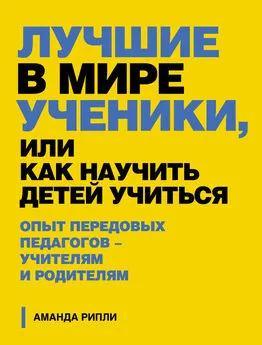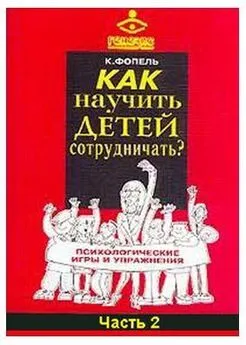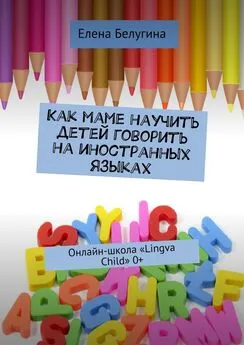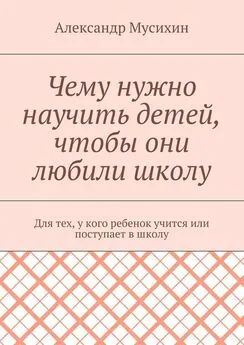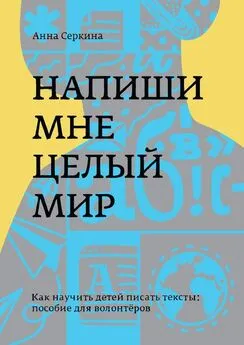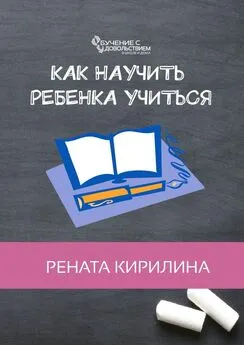Аманда Рипли - Лучшие в мире ученики, или Как научить детей учиться
- Название:Лучшие в мире ученики, или Как научить детей учиться
- Автор:
- Жанр:
- Издательство:Array Литагент «5 редакция»
- Год:2015
- Город:Москва
- ISBN:978-5-699-76412-9
- Рейтинг:
- Избранное:Добавить в избранное
-
Отзывы:
-
Ваша оценка:
Аманда Рипли - Лучшие в мире ученики, или Как научить детей учиться краткое содержание
Лучшие в мире ученики, или Как научить детей учиться - читать онлайн бесплатно полную версию (весь текст целиком)
Интервал:
Закладка:
Friedman, Thomas L. «How about Better Parents?» The New York Times,November 19, 2011.
Gamerman, Ellen. «What Makes Finnish Kids So Smart?» The Wall Street Journal, February 29, 2008.
Glenn, David. «Writing Assignments are Scarce for Students in Two Majors at Texas Colleges». The Chronicle of Higher Education, Jan. 18, 2011.
Gove, Michael. «The Benchmark for Excellence». The Independent, Jan. 6, 2011.
Greenberg, Julie, Laura Pomerance, and Kate Walsh. Student Teaching in the United States.Washington, D.C.: National Council on Teacher Quality, 2011.
Greene, Jay P., and Josh B. McGee. «When the Best Is Mediocre». Education Next 12, no. 1 (2012): 35–40.
Greene, Wayne. «Graduation Testing Bill Advances». Tulsa World,May 18, 2012.
Hakkarainen, Pentti. «Learning and Development in Play». In Nordic Childhood and Early Education: Philosophy, Research, Policy, and Practice in Denmark, Finland, Iceland, Norway, and Sweden, edited by Johanna Einarsdottir and Judith T. Wagner. Greenwich, CT: Information Age Publishing, 2006.
Hancock, LynNell. «Why Are Finland’s Schools So Successful?» Smithsonian, September, 2011.
Hanushek, Eric A., and Ludger Woessmann. Does Educational Tracking Affect Performance and Inequality? Difference-in-Differences Evidence Across Countries.Stanford: Stanford University, 2005.
Hanushek, Eric A., and Ludger Woessmann. Do Better Schools Lead to More Growth? Cognitive Skills, Economic Outcomes, and Causation.NBER Working Paper No. 14633. National Bureau of Economic Research, Cambridge, January, 2009.
Hanushek, Eric A., Paul E. Peterson, and Ludger Woessmann. «Teaching Math to the Talented: Which Countries and States are Producing High-Achieving Students?» Education Next11 no. 1 (Winter 2011): 11–18.
Hanushek, Eric A., and Ludger Woessmann. The Knowledge Capital of Nations.Forthcoming.
Hanushek, Eric A., Paul E. Peterson, and Ludger Woessmann. U.S. Math Performance in Global Perspective: How Does Each State Do at Producing High-Achieving Students? PEPG Report No. 10–19. Harvard University’s Program on Education Policy and Governance and Education Next, Cambridge, November 2010.
Heckmann, Carsten. «Schlechte Schüler wegen schlecht gebildeter Lehrer?» Der Spiegel,December 4, 2001. Translation by Theresa Buchstätter.
Helliwell, John, Richard Layard, and Jeffrey Sachs, eds. World Happiness Report. New York: Earth Institute, 2012.
Henderlong, Jennifer, and Mark R. Lepper. «The Effects of Praise on Children’s Intrinsic Motivation: A Review and Synthesis». Psychological Bulletin128, no. 5 (2002): 774–795.
Henderson, Anne, and Karen Mapp. A New Wave of Evidence: The Impact of School, Family, and Community Connections on Student Achievement.Austin: National Center for Family and Community Connections with Schools, 2002.
Henry, Brad. FY-2011 Executive Budget.Oklahoma City: Oklahoma Office of State Finance, 2010.
Herrold, Kathleen, and Kevin O’Donnell. Parent and Family Involvement in Education, 2006–07 School Year, From the National Household Education Surveys Program of 2007.Washington, DC: National Center for Education Statistics and U.S. Department of Education, 2008.
Hinton, Mick. «Legislature Junks High School Grad Test Requirement». Daily Oklahoman,May 21, 1992.
Hinton, Mick. «Governor to Require ‘Literacy Passports.’ «Daily Oklahoman, March 29, 1995.
Hofferth, Sandra L. «Changes in American Children’s Time, 1997–2003». International Journal of Time Use Research6, no. 1 (2009): 26–47.
Homel, Jacqueline, Astghik Mavisakalyan, Ha Trong Nguyen, and Chris Ryan. «School Completion: What We Learn from Different Measures of Family Background». Longitudinal Surveys of Australian Youth,Research Report 59, July 5, 2012.
Huntsinger, Carol, and Paul Jose. «Parental Involvement in Children’s Schooling: Different Meanings in Different Cultures». Early Childhood Research Quarterly24, no. 4 (2009): 398–410.
Huntsinger, Carol, Paul Jose, Shari Larson, Dana Balsink Krieg, and Chitra Shaligram. «Mathematics, Vocabulary, and Reading Development in Chinese American and European American Children over the Primary School Years». Journal of Educational Psychology92, no. 4, (2000): 745–760.
Ingram, Dale. «Family Plot». Tulsa World,October 18, 2009.
Jae-yun, Shim. «Shadow of Higher Education». The Korea Times,Nov. 30, 2011.
Jauhiainen, A., J. Kivirauma, and R. Rinne. «Status and Prestige through Faith in Education: The Successful Struggle of Finnish Primary School Teachers for Universal University Training». Journal of Education for Teaching: International Research and Pedagogy24, no. 3 (November 1998): 269.
Johnson, Jean, Jon Rochkind, and Amber Ott. «Are We Beginning to See the Light?» Public Agenda, June 2010.
Johnson, Sandy Scaffetta. Oklahoma Teacher Education Programs Under the Microscope: A Study of Oklahoma Elementary Education Mathematics Content Preparation. Oklahoma City: Oklahoma Business and Education Coalition, 2005.
Joerres, Jeff. «CEO Working Summit Synopsis». Panel at the Atlantic’s New Work Era Summit, July 19, 2011, Washington, DC.
Jordan, Jennifer. «A Higher Standard». The Providence Journal, October 11, 2009.
Kaczorowska, Teresa. «The New Need to Improve». Gazeta Wyborcza, September 2, 1999. Translation by Sarah Zarrow.
Kalbarczyk, Adam. «Against Gymnasium». Gazeta Wyborcza,October 1, 1998. Translation by Sarah Zarrow.
Kamm, Henry. «The Past Submerged: Wroclaw, Once German Breslau, Is Now a Vigorously Polish City». The New York Times, February 19, 1966.
Kanervio, Pekka. «Challenges in Educational Leadership in Finnish Municipalities». Paper presented at the 6th International Symposium on Educational Research, Kempton Park, South Africa, July 19–23, 2010.
Kang, Shin-who. «67 Percent of Private Cram Schools Overcharge Parents». The Korea Times, April 14, 2009.
Khan, Salman. The One World Schoolhouse: Education Reimagined. New York: Hachette Book Group, 2012.
Killackey, Jim, and Mick Hinton. «Outlook Uncertain for Literacy Passport». Daily Oklahoman, March 26, 1995.
Killackey, Jim. «State Education Secretary Urges High School Graduation Test». Daily Oklahoman, July 30, 1997.
Kim. Kim’s AFS Journey(blog). http://kimsafsjourney.blogspot.com/.
Kim, Hee-jin. «BAI Finds Several Big Loopholes in Admission System». Korea JoongAng Daily, January 25, 2012.
Kim, Mi-ju, and Park Su-ryon. «Students Rely on Hagwon More Than Public Schools». Korea JoongAng Daily, February 19, 2010.
Kim, Young-hwa. «Consequences of Higher Educational Expansion in Korea: Trends in Family Background and Regional Effects on Higher Educational Attainment, 1967–1984». Korean Social Science Journal 18 (1992): 139–153.
Kivirauma, Joel, and Kari Ruoho. «Excellence Through Special Education? Lessons from the Finnish School Reform». International Review of Education/Internationale Zeitschrift Fur Erziehungswissenschaft 53, no. 3 (2007): 283–302.
Koedel, Cory. «Grading Standards in Education Departments at Universities». Education Policy Analysis Archives, 19 (2011): 1–23.
The Korea Times».Education Warning». Nov. 25, 2011.
Korean Culture and Information Service. Facts about Korea.Seoul: Ministry of Culture, Sports, and Tourism, 2009.
Kruczkowska, Maria. «Reform Without Miracles». Gazeta Wyborcza, May 27, 1998. Translation by Sarah Zarrow.
Kupiainen, Sirkku, Jarkko Hautamäki, and Tommi Karjalainen. The Finnish Education System and PISA. Helsinki: Ministry of Education Publications, 2009.
Kwon, Hyunsoo. «Inclusion in South Korea: The Current Situation and Future Directions». International Journal of Disability, Development & Education, 52.1 (2005): 62.
Landers, Jim. «Finland’s Education System a Model for Dallas». The Dallas Morning News, February 8, 2009.
Langworth, Richard, ed. Churchill by Himself: The Definitive Collection of Quotations. New York: PublicAffairs, 2011.
Lee, Hyo-sik. «Private Education Costs Fall for Second Year». The Korea Times, February 17, 2012.
Lee, Ki-Bong. «The Best of Intentions: Meritocratic Selection to Higher Education and Development of Shadow Education in Korea». Ph.D. diss., Pennsylvania State University, 2003.
Lee, Robert. «18-year-old Murders Mom, Hides Body in Apartment». The Korea Herald, November 24, 2011.
Leinwand, Steven, and Alan Ginsburg. Measuring Up: How The Highest Performing State (Massachusetts) Compares to the Highest Performing Country (Hong Kong) in Grade 3 Mathematics. Washington, DC: U.S. Department of Education and The Urban Institute, 2009.
Lemov, Doug. Teach Like a Champion. San Francisco: Jossey-Bass, 2010.
Lerner, Lawrence, Ursula Goodenough, John Lynch, Martha Schwartz, and Richard Schwartz. The State of State Science Standards: Oklahoma. Washington, DC: Thomas B. Fordham Institute, 2012.
Loveless, Tom. How Well Are American Students Learning? With Special Sections on High School Culture and Urban School Achievement. Washington, DC: Brookings Institute, 2001.
Loveless, Tom. How Well Are American Students Learning? With Sections on Arithmetic, High School Culture, and Charter Schools. Washington, DC: Brookings Institute, 2002.
Luxembourg Income Study (LIS) Inequality and Poverty Key Figures, http://www.lisdatacenter.org, Luxembourg: LIS. Accessed 2012.
Lyytinen, Jaakko. «Helsinki Parents at Pains to Avoid Schools with High Proportion of Immigrants». Helsingin Sanomat, January 1, 2011.
Magnuson, Katherine, and Jane Waldfogel, eds. Steady Gains and Stalled Progress: Inequality and the Black-White Test Score Gap. New York: Russell Sage Foundation, 2008.
Mandara, Jelani. «An Empirically Derived Parenting Typology». Paper presented at the Achievement Gap Initiative Conference, Harvard University, Cambridge, June 29, 2011.
Manyika, James, Susan Lund, Byron Auguste, Lenny Mendonca, Tim Welsh, and Sreenivas Ramaswamy. An Economy That Works: Job Creation and America’s Future. McKinsey & Company, June 2011.
Marshall, Paula A. Sweet as Pie, Tough as Nails. Tulsa: Expert Message Group, 2011.
May, Henry, Angela Duckworth, and Erling Boe. Knowledge vs. Motivation: What Do International Comparisons of Achievement Test Scores Really Tell Us? Unpublished manuscript, 2012.
McKinsey & Company. The Economic Impact of the Achievement Gap in America’s Schools. April 2009.
MetLife, Inc. The MetLife Survey of the American Teacher: Teachers, Parents and the Economy. New York: MetLife, 2012.
Miliband, Ed. «On Social Mobility». Speech at the Sutton Trust-Carnegie Corporation Social Mobility Summit, London, UK, May 22, 2012.
Moskowitz, Eva, and Arin Lavinia. Mission Impossible: How the Secrets of the Success Academies Can Work in Any School.San Francisco: Jossey-Bass, 2012.
Mourshed, Mona, Chinezi Chijioke, and Michael Barber. How the World’s Most Improved School Systems Keep Getting Better. London: McKinsey & Company, 2010.
Michigan State University News. «MSU Scholars Help Minnesota Become Global Leader in Math». December 9, 2008.
Na, Jeong-ju. «Bounty Hunters Targeting ‘Hagwon.’ «The Korea Times, September 18, 2012.
Na, Jeong-ju. «Cram Schools Turning to NEAT to Boost Revenue». The Korea Times, February 8, 2012.
National Council on Teacher Quality. It’s Easier to Get into an Education School than to Become a College Football Player. Washington, DC: National Council on Teacher Quality, 2011.
National Council on Teacher Quality. Teacher Quality Roadmap: Improving Policies and Practices in LAUSD. Washington, DC: National Council on Teacher Quality, 2011.
National Governors Association. Benchmarking for Success: Ensuring U.S. Students Receive a World-Class Education. Washington, DC: National Governors Association, the Council of Chief State School Officers, and Achieve, Inc., 2008.
Читать дальшеИнтервал:
Закладка:
